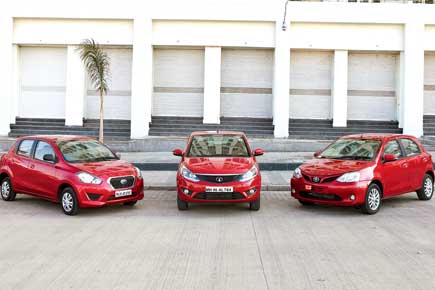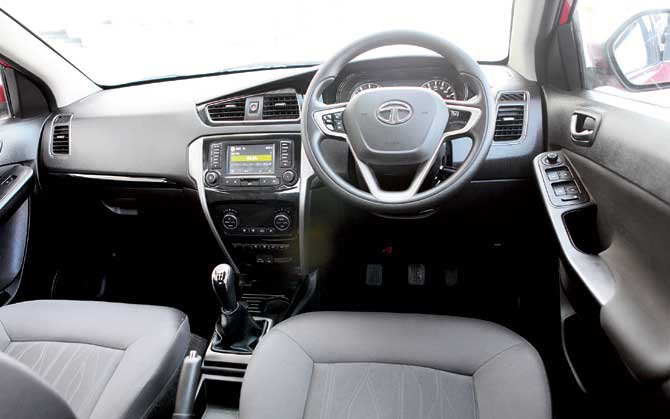The Toyota Etios Liva, Tata Bolt and Datsun Go are three cars made in India and for India, but which is the best?

Datsun Go vs Tata Bolt vs Toyota Etios Liva
ADVERTISEMENT
The Prime Minister's "Make in India" campaign has been eliciting considerable response and since we are all in favour of that slogan, we decided to compare the "made for India and in India" Tata Bolt, Toyota Etios Liva and the Datsun Go.
Design is always a subjective issue, but none of these three seem to have zing in their styling. The Tata Bolt looks decent, at best, and the Etios Liva and Datsun Go are no lookers. The same is true about their interiors. The Tata Bolt may boast of a snazzy interior with a glossy finish and a lot of goodies and the Liva might have a simple and functional cabin, but the fact remains, there is still considerable scope for improvement in terms of quality and fit-and-finish. However, if any one of these three needs desperate improvement, it is the Datsun Go. 'Built to a price', screams the car, thanks to its basic features.
The thing to like about these cars is the generous interior space offered. Despite being the tiniest of them all, the Datsun Go has the biggest boot (265 litres). But it can only seat four adults in comfort. The Tata Bolt, which looks the largest, has the tiniest boot at just 210 litres, though the leg and knee-room are pretty good and the cabin feels roomy. The Toyota trumps both Go and Bolt with the most spacious cabin and a good 251-litre boot.
Where features are concerned, the Bolt takes the cake with its long list of comforts, including a snazzy infotainment system, power windows all over, automatic folding mirrors, automatic climate control and steering-mounted controls. Toyota is second by default because basic features such as an audio system, steering-mounted controls and parking sensors are present, but apart from those, there aren't more features that the Liva can offer.
The Go, on the other hand, is austerity personified since it comes with nothing much in terms of features, even in the top-end variant. All you get is an instrument console, a flimsy steering wheel, a hand-brake that can break your knee as well as jam your hand while shifting, four seats (two bench-seats, in reality), and a plastic dashboard.
The Datsun Go's cabin barely has any features to speak of and is as plain as Jane. Pics/ Sanjay Raikar
Safety-wise, Toyota clearly wins over the other two since all variants of the Liva come with dual airbags, and two of its four models also come with ABS. The Bolt also has ABS and airbags, but only the top two variants get dual airbags while ABS is available in the top three variants. In case of the Datsun, there is neither ABS nor airbags, no matter the variant. Last but not the least, you don't even get retractable seat belts for rear passengers in the Go.
What's common to all three is that they are powered by 1.2-litre petrol engines and all are mated to five-speed manual transmissions. However, the big difference here is that the Liva and the Bolt feature four cylinders whereas the Datsun comes only with a three-pot motor.
As for the output, the Bolt is the most powerful of the trio with 90 PS and 140 Nm of torque. The Liva's 1,197-cc motor comes close in terms of power at 85 PS, but it produces only 104 Nm of torque. The Datsun Go is the least powerful at 68 PS, but it rivals the Toyota with its 104 Nm of torque.
Tata are promoting their 1.2-litre Revotron engine as a refined and powerful engine, but it is not much different from the old petrol unit that powers the Indica Vista. Neither the power delivery is linear nor the refinement levels up to the mark. The experience is further marred by high levels of turbo lag.
The Tata Bolt's interiors look upmarket, making it visually appealing
The Toyota motor feels refined and well-behaved in comparison. Power delivery is linear and since there is no turbo involved; there's no lag. It offers good driveability in most situations, thanks to good bottom-end power. Surprisingly, the three-pot motor of the Datsun Go feels all right if not outright good. It is peppy and the delivery is good, but the noise it makes is beyond your comfort level. But the 104 Nm of torque gives it good driveability in most situations.
Dynamically, the Toyota is better than the other two. It has a soft suspension set-up which gives it the best ride quality. And unlike the Bolt, the soft set-up doesn't intrude when it comes to handling and stability. The Liva feels planted at all times. The Bolt features a soft suspension which lends it a good ride quality but this also takes a toll on the car's handling abilities. The Datsun Go, on the other hand, surprises you with its dynamic ability. Its suspension set-up is just right and the car feels pretty sure-footed while-on-the-go.
After driving these cars and comparing them for what they are, we were clear about what we'd buy if given a choice. That apart, we found that all three have something that will attract buyers. The Bolt offers space, ride quality and features at a price of Rs 6.99 lakh (OTR, Pune). However, the engine still feels sluggish and unrefined. As for the Datsun Go, at Rs 4.69 lakh (OTR, Pune) it offers very little other than driving experience. Of the three then, it is the Toyota that comes across as a complete package at just Rs 11,000 more than the Bolt.
 Subscribe today by clicking the link and stay updated with the latest news!" Click here!
Subscribe today by clicking the link and stay updated with the latest news!" Click here!








